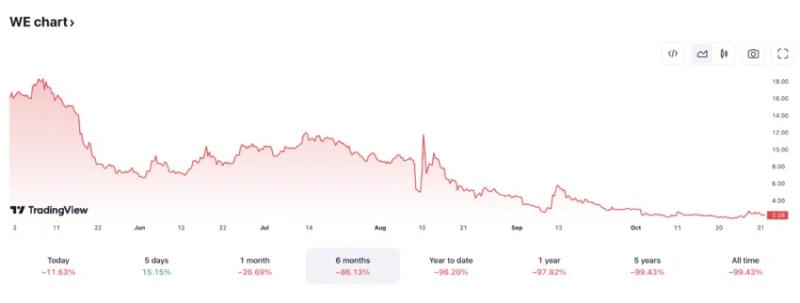
WeWork has declined to comment on the bankruptcy “speculation” and is committed to changing its capital structure. It appointed four new directors to negotiate with its creditors as it seeks to avoid bankruptcy.
WeWork Bankruptcy Blamed on Office Space Market
The company started negotiating new lease agreements after it recently determined it may not be able to survive. It spent $530 million in the first six months of the year and reportedly has $205 million cash on hand.

WeWork stock price down 86% in the last six months | Source: TradingView
WeWork allows remote workers to rent over 700 workspaces in 39 countries. Its former CEO, Adam Neumann, was ousted due to unorthodox management practices.
While the company attracted billions in venture capital at its peak, CEO David Tolley said it needed to resize its lease agreements according to how the market for office space has changed. The money spent on lease agreements was falling short of the company’s income, the company said in June.
The company’s value proposition soared during the pandemic when employers sought to make it easier for staff to collaborate remotely. Depending on COVID-19 regulations, employees of the same company living in the same area could easily gather at WeWork spaces.
Jane Sydenham, investment director at Rathbones, told the BBC that WeWork had been “a great idea” when it started out.
“But I think the problem with WeWork was it over-expanded, borrowed too much money, took on too many sites too quickly, didn’t really put in place all the checks and balances and controls that a company needs to have,” she added.
WeWork Collapse Could Benefit Rivals
As WeWork faces the threat of bankruptcy, it faces competition from companies that offer enticing opportunities for crypto nomads.
IWG plc, formerly known as Regus, has been offering its customers flexible workspace arrangements since 1989. It operates remote spaces in over 100 countries, including Portugal, which has attracted a vibrant community of decentralized developers, with Lisbon recently being named the world’s foremost crypto hub.
Coworking and Coliving Campus in Malta offers digital nomads 24/7 meeting rooms, accommodation, and private offices. Paper Hub in Prague, the capital city of the Czech Republic and the second-most crypto-friendly jurisdiction in Europe, only accepts cryptocurrency payments for its remote workspaces.

